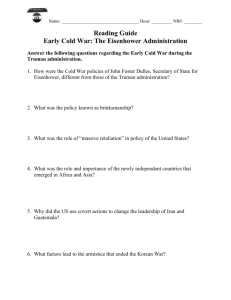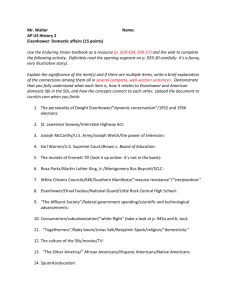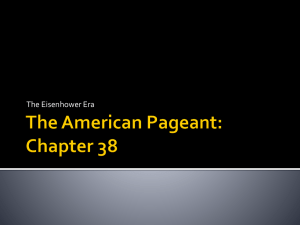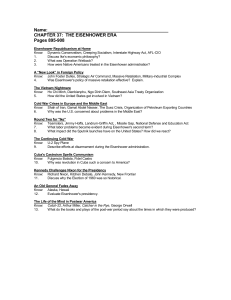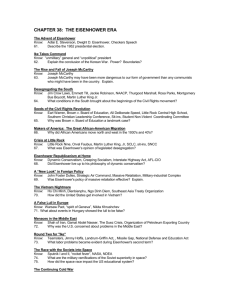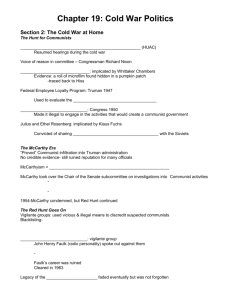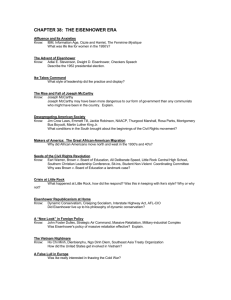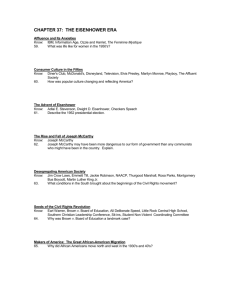The 50's
advertisement
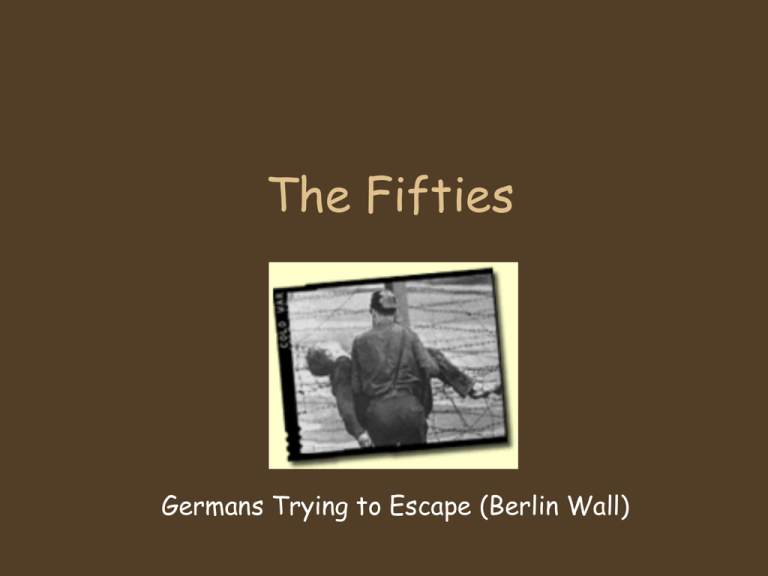
The Fifties Germans Trying to Escape (Berlin Wall) Identification (3 Points) • 1.Eisenhower Answer One • Eisenhower was the President from 1952-to 1960. The former war hero and Republican was a moderate who appealed to Democrats and Republicans alike. Identification (3 Points) • 2.Richard Nixon Answer Two • Richard Nixon was Eisenhower’s choice as Vice President. He was chosen because of his appeal to conservative Republicans due to his strong anti-Communist views. Identification (3 Points) • 3.Checkers’ Speech Answer Three • Checkers’ Speech is the nickname for a famous speech given by Nixon shortly after being chosen as Vice Presidential candidate. Accused of financial malfeasance, Nixon invoked sympathy from the public by referring to his dog “Checkers”. Identification (3 Points) • 4.McCarthy Answer Four • McCarthy was the Senator from Wisconsin who claimed the US government and certain industries were riddled with Communist sympathizers. His reign of terror ended when he overstated his case on national television. Identification (3 Points) • 5.Election of 1956 President Eisenhower Answer Five • Election of 1956 was a landslide victory for Ike. Eisenhower’s war hero status made him a shoo-in with the public. Identification (3 Points) • 6.Adlai Stevenson Answer Six • Adlai Stevenson ran against Eisenhower in 1952 and 1956. The liberal Governor of Illinois was overmatched and lost by a wide margin both times. Identification (3 Points) • 7.AFL-CIO Answer Seven • AFL-CIO was a merger of the two largest unions in America. By merging, each union gained more clout with management when negotiating contracts. Identification (3 Points) • 8.Agribusiness Answer Eight • Agribusiness is when smaller “family’ farms are bought by larger farms leading to economies of sale in agriculture. By 1959 half of the farmland in the US belonged to 4% of the farmers. Identification (3 Points) • 9.“Economy of Abundance” John Kenneth Galbraith Answer Nine • “Economy of Abundance” was a theory of economics espoused by John Kenneth Galbraith that said that through modern technology, more variety and quantities of goods and services could be produced. This abundance led to an unprecedented standard of living for common Americans during the Fifties. Identification (3 Points) • 10.Automation Answer Ten • Automation is the operation of manufacturing by mechanical or electronic means. Automation made industry more efficient and saved consumers money through lower pricing. Identification (3 Points) • 11.John Foster Dulles Answer Eleven • John Foster Dulles was Eisenhower’s Secretary of State for most of his two terms. He sought not just to contain Communism, but also to help countries rid them selves of Communism through aid, arms and covert operations. Identification (3 Points) • 12.CIA Answer Twelve • CIA is the Central Intelligence Agency. During the Fifties, the CIA was involved in the overthrow of several foreign governments thought to be unfriendly to the US. Identification (3 Points) • 13.Viet Nam Answer Thirteen • Viet Nam was a French colony in Indochina. During the Fifties, the French tried to keep Communism out of Viet Nam. Despite aid from the US, the French were unsuccessful and the northern part of Viet Nam became a communist country. Identification (3 Points) • 14.Korean War Answer Fourteen • Korean War ended when the UN split the country in two along the 38th parallel. The north became a communist country and the south became Democratic. Identification (3 Points) • 15.Abdel Nasser Answer Fifteen • Abdel Nasser was the leader of Egypt. When France, England and Israel joined forces to take the Suez Canal in Egypt, the US voted with the Soviets to condemn the action and the three countries left Egypt. Identification (3 Points) • 15.Ho Chi Minh Answer Sixteen • Ho Chi Minh was the leader of the Communist forces in Viet Nam. He led the military action that ousted the French culminating in the battle at Dien Bien Phu. Identification (3 Points) • 17.Suez Crisis Answer Seventeen • Suez Crisis occurred when the British, French and others invaded Egypt and seized the Suez Canal. The US did not side with its’ usual allies and avoided a possible confrontation with the USSR, Egypt’s allies. Identification (3 Points) • 18.SEATO Answer Eighteen • SEATO is the South East Asian Treaty Organization. This alliance was designed by the US to provide mutual defense of the nations of Southeast Asia against Communist aggression. Identification (3 Points) • 19.Fidel Castro Answer Nineteen • Fidel Castro was the leader of the revolutionaries in Cuba. Although the US at first thought Cuba would be a friend of the US, he turned to the USSR and made Cuba a client nation of the Soviets. Identification (3 Points) • 20.OAS Answer Twenty • OAS is the Organization of American States. This alliance was designed to combat Communism in Central and South America. In effect this organization was dominated by the US and provided no protection against internal Communist movements. Short Answer One (10 Points) • Why did Congress decide it was necessary to amend the constitution concerning Presidential succession during Eisenhower’s term of office? Eisenhower (With Churchill) Answer • Eisenhower had many heart problems during his two terms of office. Congress became concerned that a President could become incapacitated while still alive, leaving the US for all intents and purposes without a President. • The amendment (26th), called for a mechanism for the President to choose a new Vice President should that office become vacant and for the Cabinet to certify the President as incapable to perform his duties. It also allowed for the President to temporarily give up the powers of the office should he be unable to perform his duties for a short time. Short Answer Two (10 Points) • What was Eisenhower’s economic philosophy as President? Ike with Khrushchev Answer • Eisenhower believed in minimal government regulation of business that led to many mergers in the 1950’s. He also felt that taxes and spending should be kept as low as possible by the government. • Although he did not wish to end social programs such as Social Security, he did want to cut back on Agriculture subsidies introduced during the New Deal. Short Answer Three (10 Points) • How did McCarthyism end and what was Eisenhower’s role in its’ demise? McCarthy Hearings Answer • McCarthyism ended due to the public and the Congress wearying of his tactics as well as the fact that Eisenhower disapproved of what the Senator from Wisconsin was doing. Finally, televised hearings showed McCarthy to a national audience and exposed him for what he really was. Short Answer Four (10 Points) • What was the main thesis of Eisenhower’s “Farewell Speech” and why was it so impressive? IKE Answer • Eisenhower warned the country to beware of the “military-industrial complex” which he feared could exert an undue influence on the country. He also felt that the growth of the military industrial complex could endanger the liberties and political freedoms of US citizens. • This statement was impressive because it came from IKE who spent most of his life in the military and was regarded by most Americans as a war hero.
